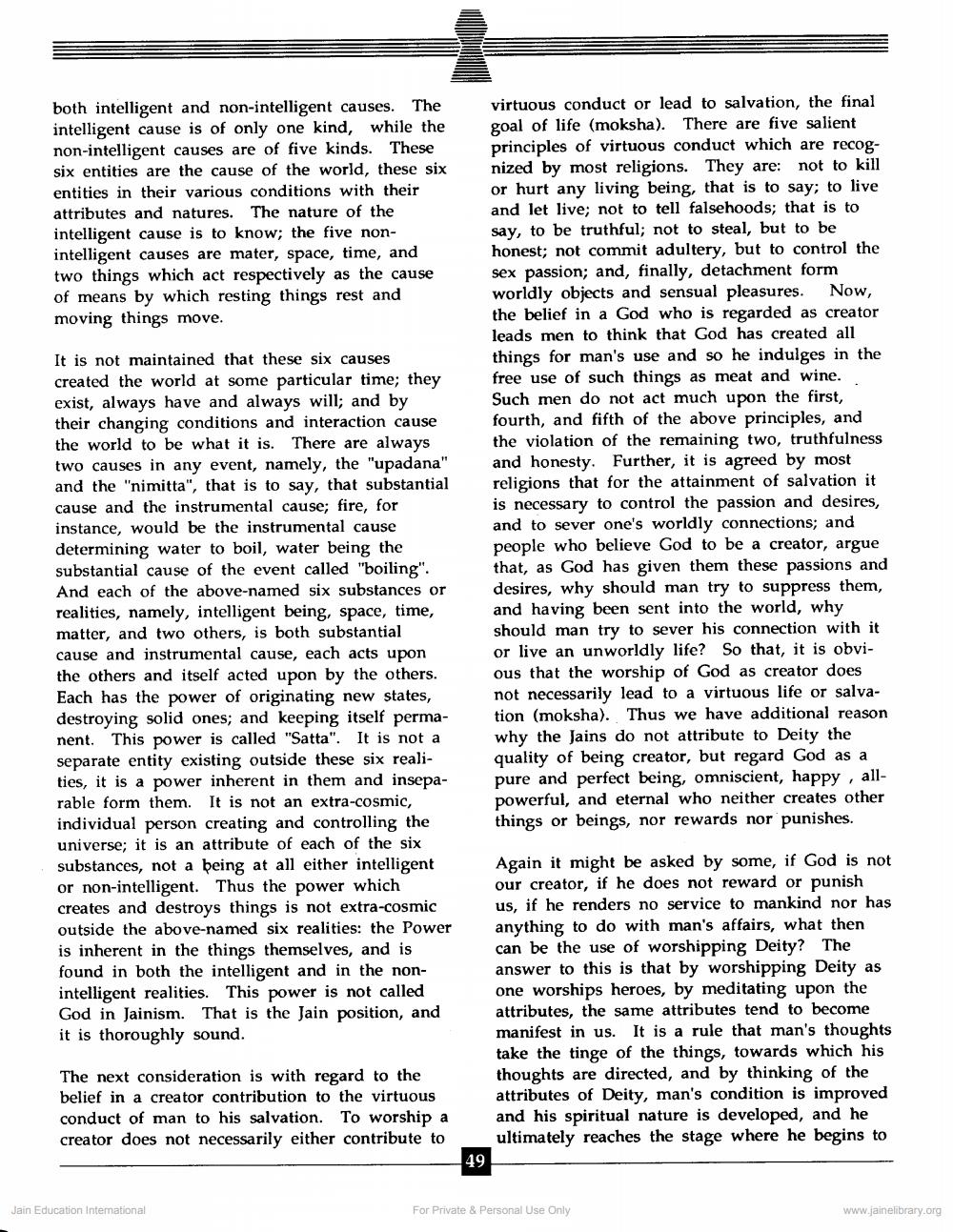________________
both intelligent and non-intelligent causes. The intelligent cause is of only one kind, while the non-intelligent causes are of five kinds. These six entities are the cause of the world, these six entities in their various conditions with their attributes and natures. The nature of the intelligent cause is to know; the five nonintelligent causes are mater, space, time, and two things which act respectively as the cause of means by which resting things rest and moving things move.
It is not maintained that these six causes created the world at some particular time; they exist, always have and always will; and by their changing conditions and interaction cause the world to be what it is. There are always two causes in any event, namely, the "upadana" and the "nimitta", that is to say, that substantial cause and the instrumental cause; fire, for instance, would be the instrumental cause determining water to boil, water being the substantial cause of the event called "boiling". And each of the above-named six substances or realities, namely, intelligent being, space, time, matter, and two others, is both substantial cause and instrumental cause, each acts upon the others and itself acted upon by the others. Each has the power of originating new states, destroying solid ones; and keeping itself permanent. This power is called "Satta". It is not a separate entity existing outside these six realities, it is a power inherent in them and inseparable form them. It is not an extra-cosmic, individual person creating and controlling the universe; it is an attribute of each of the six substances, not a being at all either intelligent or non-intelligent. Thus the power which creates and destroys things is not extra-cosmic outside the above-named six realities: the Power is inherent in the things themselves, and is found in both the intelligent and in the nonintelligent realities. This power is not called God in Jainism. That is the Jain position, and it is thoroughly sound.
virtuous conduct or lead to salvation, the final goal of life (moksha). There are five salient principles of virtuous conduct which are recognized by most religions. They are not to kill or hurt any living being, that is to say; to live and let live; not to tell falsehoods; that is to say, to be truthful; not to steal, but to be honest; not commit adultery, but to control the sex passion; and, finally, detachment form worldly objects and sensual pleasures. Now, the belief in a God who is regarded as creator leads men to think that God has created all things for man's use and so he indulges in the free use of such things as meat and wine. Such men do not act much upon the first, fourth, and fifth of the above principles, and the violation of the remaining two, truthfulness and honesty. Further, it is agreed by most religions that for the attainment of salvation it is necessary to control the passion and desires, and to sever one's worldly connections; and people who believe God to be a creator, argue that, as God has given them these passions and desires, why should man try to suppress them, and having been sent into the world, why should man try to sever his connection with it or live an unworldly life? So that, it is obvious that the worship of God as creator does not necessarily lead to a virtuous life or salvation (moksha). Thus we have additional reason why the Jains do not attribute to Deity the quality of being creator, but regard God as a pure and perfect being, omniscient, happy, allpowerful, and eternal who neither creates other things or beings, nor rewards nor punishes.
Again it might be asked by some, if God is not our creator, if he does not reward or punish us, if he renders no service to mankind nor has anything to do with man's affairs, what then can be the use of worshipping Deity? The answer to this is that by worshipping Deity as one worships heroes, by meditating upon the attributes, the same attributes tend to become manifest in us. It is a rule that man's thoughts take the tinge of the things, towards which his thoughts are directed, and by thinking of the attributes of Deity, man's condition is improved and his spiritual nature is developed, and he ultimately reaches the stage where he begins to
The next consideration is with regard to the belief in a creator contribution to the virtuous conduct of man to his salvation. To worship a creator does not necessarily either contribute to
Jain Education International
For Private & Personal Use Only
www.jainelibrary.org




